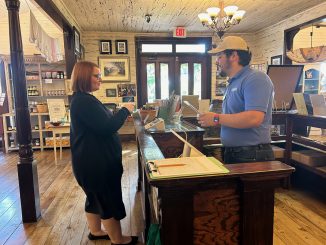
By DOUG SIMPSON, Associated Press Writer
SHREVEPORT, La. (AP) _ Walter Boasso scans a crowd of voters and wonders aloud why he’s running for governor when Louisiana’s economy is struggling, its hurricane recovery stumbling.
The crowd chuckles at his explanation: “I need to run for governor like I need a hole in the head. Running for governor of Louisiana at this time in history is like waking up in the morning and saying, ‘I want to be president of a bankrupt company.”’
Nonetheless, Louisiana needs a new governor – and Boasso believes he’s the man for the job.
Facing long-shot odds, the multimillionaire tells voters that he’s a fixer, someone who’s spent a career spotting and solving problems. The Boasso message: he can fix what’s wrong with Louisiana, too.
“I solve problems,” Boasso says. “That’s what I do for a living.”
A big problem he needs to fix soon: he badly trails U.S. Rep. Bobby Jindal in the polls. With five weeks left before the Oct. 20 primary, Boasso is fighting for votes alongside two other candidates, businessman John Georges and Public Service Commissioner Foster Campbell, and trying to force Jindal into a November runoff election.
Boasso started life humbly in St. Bernard Parish, one of six children in a family on food stamps, he said. He was a lineman on the Chalmette High School football team, and attended the University of New Orleans.
While a college student, he started the company that became Boasso America Corp. and made him millions. Boasso is fond of telling the tale of the company’s origins: he bought a box of laundry detergent and a garden hose, and scrubbed shipping containers by hand. From an initial $175 investment, the company expanded into a national shipping container firm. He sold it this year for roughly $60 million.
He entered politics in 2003, winning a state Senate seat in his first-ever political campaign.
Boasso won statewide attention two years later, a few months after Hurricane Katrina, when he championed an overhaul of the levee boards surrounding New Orleans – a fractured oversight system that Boasso said needed reform and consolidation.
Boasso faced strong opposition from other southeast Louisiana lawmakers, but pushed the bill through the Legislature after bringing together a coalition of supporters including community groups, New Orleans business leaders and Gov. Kathleen Blanco.
His admirers say the levee board success was typical: Boasso has a habit of tackling big projects, collecting important allies and winning his battles. Daniel Bourgeois, a longtime friend, said he was not surprised to hear Boasso had decided to try to jump from the Legislature to the Governor’s Mansion.
“I’m not surprised at anything Walter does,” said Bourgeois, who worked with him on programs in St. Bernard Parish for the Red Cross, the Council on Aging and other groups. “Walter finds a way to succeed.”
Boasso says he’s now running for governor because he sees far too many other things that need fixing in Louisiana _ the business environment, the prison system, public education _ that are too big for him to solve as a legislator.
“The only way you can get things done in this state, you got to be the guy in charge,” he says.
Boasso’s campaign, once focused almost entirely on attacking Jindal, has begun fleshing out policy ideas. Among the campaign planks:
-Give homeowners a tax credit equal to 78 percent of the increases they’ve paid in homeowners insurance since Hurricane Katrina.
-Create a new cabinet position, secretary of ports and waterways, aimed at boosting the economy by taking better advantage of Louisiana’s ports and preventing port-related business from going to other coastal states.
-Change the way many of the state’s convicts are treated, by setting up “Boasso camps,” an intermediate sentencing system in which the convicts would be offered education, vocational training and substance abuse treatment.
-Refashion the state’s system of standardized testing in public schools. Boasso wants students tested throughout the school year, and judged on their progress, rather than judging them on a single “high stakes” test and holding back those who fail.
Boasso faces skepticism from loyal Democrats and loyal Republicans because he’s switched parties twice in a decade. He was a Democrat until the mid-1990s, then joined the GOP for his Senate campaign. He switched back to the Democrats several months ago, acknowledging the futility of running as a Republican when Jindal has an apparent lock on that party’s support.
Political analysts say Boasso’s campaign faces far deeper problems than his party switches. John Sutherlin, a political scientist at the University of Louisiana-Monroe, said Boasso’s television ads that ridiculed Jindal won plenty of attention, but probably didn’t win Boasso many new supporters.
A Southern Media & Opinion Research poll last month showed Boasso had 14 percent of the vote, compared to 63 percent for Jindal. Democrat Campbell and Georges _ a Republican who has since become an independent _ trailed Boasso.
Sutherlin said Jindal’s lead might be insurmountable, a problem Boasso might not be able to solve.
“I don’t know that there’s anything that Boasso could do between now and Oct. 20 to make the runoff,” Sutherlin said.
Boasso acknowledges the long odds, but insists he’s got a good chance of forcing a runoff. He chose a governor’s campaign over a run for another four-year Senate term, he says, because he’s the best man to solve Louisiana’s problems.




Be the first to comment